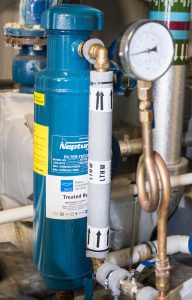Closed Water Treatment
Water Treatment of closed water systems ensure compliance with numerous legislative documents. Closed water systems such as heating and chilled water systems are prone to attack from slime forming bacteria and the effects of scale and corrosion. Both of these elements can reduce the efficacy and life span of closed water systems.
Guidance documents such as the BSRIA documents, the BG/29 / BG/50 and the British Standards documents BS7593 / BS8552 provide business users and service providers like Water Compliance Solutions with the relevant information to ensure water systems are treated and maintained to a suitable standard. Water Compliance Solutions can offer advice and solutions to business and private owners on how to best ensure that the water with their closed water systems is treated to provide efficacy and prolong the life span of the system and it associated items of plant.
Biocides
Biocides are used to control the growth of bacteria within the closed systems which can effective the efficacy and life span of the system
The three main bacteria’s to control are NRB ( Nitritre Reducing Bacteria ), SRB ( Sulphur Reducing Bacteria ) and Pseudomonas ( Slime Forming Bacteria )
NRB
NRB or Nitrite Reducing Bacteria does exactly as it sounds, it reduces or eats the amount of Nitrite in the closed water system. Nitrite is a very good scale and corrosion inhibitor either used by itself or in a multi metal based inhibitor with molybdate as nitrite passivates more efficiently than molybdate.
If NRB is found in a system the usual result is the reduction of Nitrite and therefore the risk of scale and corrosion occurring in the closed water system there reducing the efficacy and life span of the system
SRB
SRB or Sulphur Reducing Bacteria, which use sulphur as an energy source, are the primary producers of large quantities of hydrogen sulphide. These bacteria chemically change natural sulphates in water to hydrogen sulphide. Sulphur-reducing bacteria live in oxygen-deficient environments such as deep wells, plumbing systems, water softeners and water heaters. These bacteria usually flourish on the hot water side of a water distribution system.
The mains concern associated with SRB’s is that hydrogen sulphide is corrosive to metals such as iron, steel, copper and brass.
Having SRB’s also reduce the amount of Nitrite in the system, therefore this bacteria needs to be controlled in closed heating and chilled water systems
Pseudomonas
Pseudomonas are slime forming bacteria. These slime block up items of plant such as fan coils and plate heat exchangers.
Dosing with suitable biocides will prevent the effect of the above bacteria’s within closed water systems. Pseudomonas are very prone to growth in chilled water systems where no biocide has been dosed and can majorly effective the efficiency of the coiling coil
Scale and Corrosion Inhibitors
The two main types of scale and corrosion inhibitors used in the water treatment industry are Nitrite and Molybdate
Nitrite
Nitrite is a very effective scale and corrosion inhibitor as it passivates quickly onto the surface of the metals to ensure protection from the onset. Due to the aggressive nature of Nitrite is acts as a scraper and can lead to leaks in old water systems where protection has not been provided previously. Nitrite is usually used in District Heating systems and old water systems containing mainly steel and iron parts
Nitrite cannot be used in heating or chilled water systems containing Aluminium or Zinc as the Nitrite will eat through these soft metals and therefore produce leaks in the system
Molybdate
Molybdate is an extremely effective scale and corrosion inhibitor as it unlike Nitrite it provides a film on the internal surfaces of the pipework therefore protecting the pipework from any further corrosion. It is also useful at protecting old systems where leaks can occur as the molybdate film can help reduces the risk of further leaking
Molybdate is usually blended with a small amount of nitrite. The nitrite passivate quickly and attacks the area if corrosion then allow the molybdate to create a film over this area preventing any further corrosion occurring.
Molybdate can be used in multi metal systems ( or yellow metal systems ) , systems containing Aluminium, zinc, Copper etc
In summary by using the correct biocide and scale and corrosion inhibitor, heating and chilled water systems can remain efficient and have a longer life span therefore saving the customer on energy and repair bills


